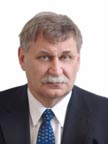Herbert Reichl: Difference between revisions
(Created page with "== Biography == Herbert Reichl was one of the first researchers to foresee the importance of microelectronics packaging in bridging the gap between research and applications. H...") |
No edit summary |
||
| (3 intermediate revisions by 2 users not shown) | |||
| Line 1: | Line 1: | ||
== Biography | ==Biography== | ||
[[Image:Reichl H.jpg|thumb|right]] | |||
[[ | Herbert Reichl was one of the first researchers to foresee the importance of microelectronics packaging in bridging the gap between research and applications. His pioneering work on heterogeneous integration, three-dimensional packaging, and embedded passive and active components set the path for future microelectronics, enabling applications ranging from mobile phones to wearable sensors. As founding director of Germany’s Fraunhofer Institute for Reliability and Microintegration (IZM), Dr. Reichl has led many integration strategies and shepherded their transfer to commercialization. The exciting concept of electronic grains (or eGrains) is just one example. Functioning as tiny electronic sensors that can receive, process and store information, eGrains are very small, autonomous modules that can communicate with each other wirelessly, enabling “smart” devices. An [[IEEE Fellow Grade History|IEEE Fellow]], Dr. Reichl is currently a professor at the Technical University of Berlin, Germany, and continues to mentor generations of students and research staff in the area of R&D. | ||
[[Category: | [[Category:Electronic equipment manufacture|Reichl]] [[Category:Electronics packaging|Reichl]] | ||
[[Category: | |||
Revision as of 13:53, 29 July 2013
Biography
Herbert Reichl was one of the first researchers to foresee the importance of microelectronics packaging in bridging the gap between research and applications. His pioneering work on heterogeneous integration, three-dimensional packaging, and embedded passive and active components set the path for future microelectronics, enabling applications ranging from mobile phones to wearable sensors. As founding director of Germany’s Fraunhofer Institute for Reliability and Microintegration (IZM), Dr. Reichl has led many integration strategies and shepherded their transfer to commercialization. The exciting concept of electronic grains (or eGrains) is just one example. Functioning as tiny electronic sensors that can receive, process and store information, eGrains are very small, autonomous modules that can communicate with each other wirelessly, enabling “smart” devices. An IEEE Fellow, Dr. Reichl is currently a professor at the Technical University of Berlin, Germany, and continues to mentor generations of students and research staff in the area of R&D.
